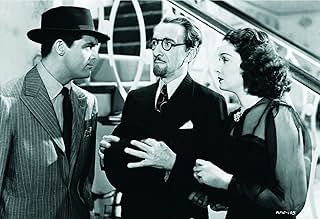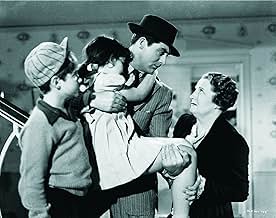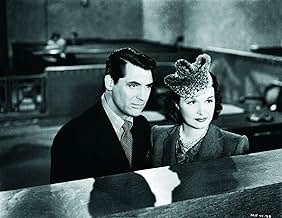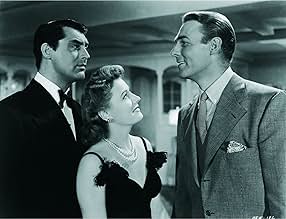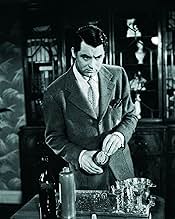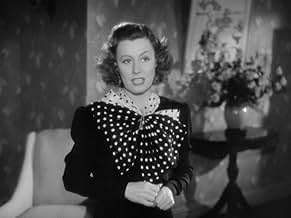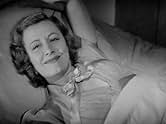AVALIAÇÃO DA IMDb
7,2/10
12 mil
SUA AVALIAÇÃO
Desaparecida há sete anos e supostamente morta, uma mulher volta para casa no dia do segundo casamento do marido.Desaparecida há sete anos e supostamente morta, uma mulher volta para casa no dia do segundo casamento do marido.Desaparecida há sete anos e supostamente morta, uma mulher volta para casa no dia do segundo casamento do marido.
- Direção
- Roteiristas
- Artistas
- Indicado a 3 Oscars
- 3 vitórias e 3 indicações no total
Jean Acker
- Postponed Case Witness
- (não creditado)
Murray Alper
- Yosemite Bartender
- (não creditado)
Leon Belasco
- Waiter - Pacific Club Poolside
- (não creditado)
Joe Cabrillas
- Phillip
- (não creditado)
Bill Cartledge
- Page Boy Paging Burkett
- (não creditado)
Chester Clute
- Shoe Salesman
- (não creditado)
Corky
- Corky the Dog
- (não creditado)
Avaliações em destaque
Cary Grant makes this the best of the numerous versions of the script -- later attempted as SOMETHING'S GOT TO GIVE (Marilyn Monroe's last film) and remade as MOVE OVER, DARLING.
Just the expressions Grant has on his face make this worth watching. It's a delightful look at him in a classic comic predicament -- a man who thinks his first wife is dead discovers on his honeymoon night with his second wife that wife #1 is still amongst the living. The next complication: she has spent 7 years with another man -- and Grant gets to do his best as the jealous husband.
This is just plain funny.
Just the expressions Grant has on his face make this worth watching. It's a delightful look at him in a classic comic predicament -- a man who thinks his first wife is dead discovers on his honeymoon night with his second wife that wife #1 is still amongst the living. The next complication: she has spent 7 years with another man -- and Grant gets to do his best as the jealous husband.
This is just plain funny.
There are some lovely, touching and dryly amusing scenes in this film. Kanin and the scriptwriters manage to form a substantive, if occasionally gossamer light, whole out of the playing of fine leads and canny comic incidents. The basic story may be the oldest of chestnuts, but it is here embellished with some degree of incisiveness. Grant's scene by the pool with Dunne and Scott reaches a fine pitch of hilarity, and who can forget the impressionistic scene of Scott's diving coming into Grant's mind and being presented in miniature on-screen?
That master player of light, witty material, Grant, is of course sublime, and I was surprised by Irene Dunne - who I had never previously seen in a lead film role. She was magnificently feline, as Pauline Kael says; dispensing slinky, fluttering phrases and quips, and making it clear what a laugh the character is having; she seems rather to be getting off on the entangled situation. The speech patterns are drolly created by Dunne; wonderful Southern hamming, or archetypal screwball dame quick-talk... Her warming, gadding-about voice is charms, along with deft facial acting; look at the "Oh Bianca..." scene at the hotel early on, where she sensuously reclines on a settee and gets Grant to pretend he is entering the room and kissing his new wife. Minxish mischief of the most heartwarming kind, aye...!
Remarkable to think that Ms. Dunne was over forty when this was made. She has the bearing of many years younger and conveys an impressive vigour. One takes to her unconventional good looks; her slight awkwardness as a 'star' is amusingly alluded to, under the surface, in her son's dialogue late on; very poignant little moment, that. Like Rosalind Russell and Kate Hepburn, she is no textbook beauty, and it is her characterful playing conveys a winking, winning attractiveness. Why is it that we have so few similarly idiosyncratic actresses around today? All - or rather much - has to be homogenised; pop star product looks are apparently required, and conveyor-belted into mainstream films. Film is missing the enticing depths of real-life when it opts for the conformist teenage boy's supposed 'dream woman' - mass-media-fostered - over a greater variety of people and appearances, as one encounters in actual reality.
The actor playing the world-weary, rather Robb Wilton-esquire magistrate ought to have been involved more than he was; an enjoyable turn, that would have been effectively woven deeper into the narrative. Randolph Scott amused slightly too, in his support role; a worthy foil. Things did perhaps get rather sentimental with the involvement of the couple's children, although this is hardly the worst such offender in Hollywood history. The insidious wryness seems completely blunted by the end, when the couple are finally reconciled. One may be charmed by the actors' performances, but it all starts to seem a bit indulgent, and the feeling grows that chances were missed.
But really, one must be indulgent, critically; there is priceless stuff in this film's fibre, and while it fires not on all screwball-comedy cylinders, it is a very pleasant feature with glorious screen presences making (deceptively) light of life.
That master player of light, witty material, Grant, is of course sublime, and I was surprised by Irene Dunne - who I had never previously seen in a lead film role. She was magnificently feline, as Pauline Kael says; dispensing slinky, fluttering phrases and quips, and making it clear what a laugh the character is having; she seems rather to be getting off on the entangled situation. The speech patterns are drolly created by Dunne; wonderful Southern hamming, or archetypal screwball dame quick-talk... Her warming, gadding-about voice is charms, along with deft facial acting; look at the "Oh Bianca..." scene at the hotel early on, where she sensuously reclines on a settee and gets Grant to pretend he is entering the room and kissing his new wife. Minxish mischief of the most heartwarming kind, aye...!
Remarkable to think that Ms. Dunne was over forty when this was made. She has the bearing of many years younger and conveys an impressive vigour. One takes to her unconventional good looks; her slight awkwardness as a 'star' is amusingly alluded to, under the surface, in her son's dialogue late on; very poignant little moment, that. Like Rosalind Russell and Kate Hepburn, she is no textbook beauty, and it is her characterful playing conveys a winking, winning attractiveness. Why is it that we have so few similarly idiosyncratic actresses around today? All - or rather much - has to be homogenised; pop star product looks are apparently required, and conveyor-belted into mainstream films. Film is missing the enticing depths of real-life when it opts for the conformist teenage boy's supposed 'dream woman' - mass-media-fostered - over a greater variety of people and appearances, as one encounters in actual reality.
The actor playing the world-weary, rather Robb Wilton-esquire magistrate ought to have been involved more than he was; an enjoyable turn, that would have been effectively woven deeper into the narrative. Randolph Scott amused slightly too, in his support role; a worthy foil. Things did perhaps get rather sentimental with the involvement of the couple's children, although this is hardly the worst such offender in Hollywood history. The insidious wryness seems completely blunted by the end, when the couple are finally reconciled. One may be charmed by the actors' performances, but it all starts to seem a bit indulgent, and the feeling grows that chances were missed.
But really, one must be indulgent, critically; there is priceless stuff in this film's fibre, and while it fires not on all screwball-comedy cylinders, it is a very pleasant feature with glorious screen presences making (deceptively) light of life.
A curious one that leaves a mildly bitter taste in the mouth. It's funny alright (but never hilarious), and the acting from - and chemistry between - Irene Dunne and Cary Crant is exquisite as always. But the film's fundamental problem is that none of the characters are particularly likable. Throughout the film three of the four main characters take their turn to behave despicably, yet the new wife - a woman who's merely unpleasant - is the villain of the piece; constantly the butt of jokes and fair game for ridicule even though she's done absolutely nothing to warrant it. At times it's like watching two spoilt brats from the Hamptons bullying their visiting second-cousin from the Bronx.
The script is also strangely stunted, best witnessed in the scenes before the judge. They really should have been classic screwball moments - the ingredients were there - yet between the lengthy silences and repetitive parrot-dialogue it falls almost completely flat. The gaping plot holes and poor script continuity can't be forgiven either, even allowing for the fact the film's seventy years old.
Don't get me wrong, I laughed, and I enjoyed myself, and I thought it was a decent film. It's just that the character's actions don't stand up too well under scrutiny.
The script is also strangely stunted, best witnessed in the scenes before the judge. They really should have been classic screwball moments - the ingredients were there - yet between the lengthy silences and repetitive parrot-dialogue it falls almost completely flat. The gaping plot holes and poor script continuity can't be forgiven either, even allowing for the fact the film's seventy years old.
Don't get me wrong, I laughed, and I enjoyed myself, and I thought it was a decent film. It's just that the character's actions don't stand up too well under scrutiny.
This gets pretty good comic mileage out of the often-used 'Enoch Arden' (or, as here, 'Ellen Arden') idea of the long-lost spouse who returns to find his/her spouse now involved with someone else. Numerous movies have used it both for drama and for comedy, and in this case, the premise is adapted to the screwball comedy formula that was so popular for a time in the 1930s and 1940s.
The story starts by slightly revising the usual setup, with Irene Dunne as the formerly shipwrecked spouse, Cary Grant as the husband who has since become involved with another woman (Gail Patrick), plus Randolph Scott as a wild card in the relationships. Practically every stage of the story is highly implausible (probably deliberately so) but amusing, and it is generally left to the cast to make things work, which they usually do.
Grant usually seems quite at home in this kind of comedy, and he and Dunne work well together, depicting their characters' relationship with the kinds of intangibles that help make the whole scenario more believable. Patrick is always quite good as an elegantly icy rival to the heroine, and Scott also works well here in his role. Amongst the supporting cast, Granville Bates gets some very good moments as the grouchy judge.
For as far-fetched as the scenario seems at times, it works pretty well. The cast is strong enough to carry the weight, and it would have been hard to improve upon their combination of talents. It doesn't have quite the depth of comic variety or the subtlety of implied commentary that the best screwball comedies have, but it's an entertaining movie worth seeing.
The story starts by slightly revising the usual setup, with Irene Dunne as the formerly shipwrecked spouse, Cary Grant as the husband who has since become involved with another woman (Gail Patrick), plus Randolph Scott as a wild card in the relationships. Practically every stage of the story is highly implausible (probably deliberately so) but amusing, and it is generally left to the cast to make things work, which they usually do.
Grant usually seems quite at home in this kind of comedy, and he and Dunne work well together, depicting their characters' relationship with the kinds of intangibles that help make the whole scenario more believable. Patrick is always quite good as an elegantly icy rival to the heroine, and Scott also works well here in his role. Amongst the supporting cast, Granville Bates gets some very good moments as the grouchy judge.
For as far-fetched as the scenario seems at times, it works pretty well. The cast is strong enough to carry the weight, and it would have been hard to improve upon their combination of talents. It doesn't have quite the depth of comic variety or the subtlety of implied commentary that the best screwball comedies have, but it's an entertaining movie worth seeing.
At first, I must say that this movie doesn't exceptionally stand out from the whole bunch of screwball comedies produced in the times of Great Depression in the USA. The first part of My Favorite Wife may be even called boring, due to a very slow narrative process and lack of any specific action. Of course, it's just an introduction to the plot and the viewer has to believe that in a moment something extraordinarily funny and crazy will happen. And it does, along with the entrance of, fantastic as always, Irene Dunne. The story presented in this movie is so ridiculous that it will make you laugh just reading about it.
It seemed like another regular wedding for Mr. Nick Arden (Cary Grant) and his new wife Ellen (Gail Patrick). His first wife is presumed dead after drowning somewhere far at sea seven years ago, and he wants to be form a happy relationship with a new woman. Guess what happens when Ellen Arden (Irene Dunne) suddenly shows up at their doorstep more alive than ever – all hell breaks loose and Nick becomes involved with two women at the same time. Additionally, his two wives (how grand it sounds) aren't particularly fond of each other and start to make Nick's life much harder than he imagined. And if this wasn't enough, somewhere on the road Nick meets Steve Burkett (Randolph Scott), a handsome man, with whom Ellen was stranded on a deserted island for seven long years. Level of jealousy goes through the roof, and the real 'fun' starts for all people involved in this ludicrous affair. Finally, Nick has to decide, who to choose, as it may seem that from a point of having two beautiful women at once he will ultimately be left all alone.
The movie provides a great amount of laughs, due to many amusing one-liners and gags, especially on the part of Cary Grant's perfect sense of humorous acting abilities. Every screwball film, in which he stars abruptly becomes much more entertaining, because of his irrefutable acting manners and charisma, so important for a funny leading man. And he does it differently every time. Even though the movies may seem similar, the portrayals of characters that he presents always have other specific comedic feels to it.
And the relationship that he forms with Irene is brilliant; you can sense that deep emotional attachment coming from their characters in every scene. Maybe seven years have passed, but the flame in their hearts still burns. They can't argue that their need to be together is so strong that it will surpass anything.
All in all, I can't call it My Favorite Screwball, but I certainly might recommend it to anyone, who is need of a light-hearted American comedy that may provide a positive shock in the sense of absurdity and amount of laughs that come with it.
It seemed like another regular wedding for Mr. Nick Arden (Cary Grant) and his new wife Ellen (Gail Patrick). His first wife is presumed dead after drowning somewhere far at sea seven years ago, and he wants to be form a happy relationship with a new woman. Guess what happens when Ellen Arden (Irene Dunne) suddenly shows up at their doorstep more alive than ever – all hell breaks loose and Nick becomes involved with two women at the same time. Additionally, his two wives (how grand it sounds) aren't particularly fond of each other and start to make Nick's life much harder than he imagined. And if this wasn't enough, somewhere on the road Nick meets Steve Burkett (Randolph Scott), a handsome man, with whom Ellen was stranded on a deserted island for seven long years. Level of jealousy goes through the roof, and the real 'fun' starts for all people involved in this ludicrous affair. Finally, Nick has to decide, who to choose, as it may seem that from a point of having two beautiful women at once he will ultimately be left all alone.
The movie provides a great amount of laughs, due to many amusing one-liners and gags, especially on the part of Cary Grant's perfect sense of humorous acting abilities. Every screwball film, in which he stars abruptly becomes much more entertaining, because of his irrefutable acting manners and charisma, so important for a funny leading man. And he does it differently every time. Even though the movies may seem similar, the portrayals of characters that he presents always have other specific comedic feels to it.
And the relationship that he forms with Irene is brilliant; you can sense that deep emotional attachment coming from their characters in every scene. Maybe seven years have passed, but the flame in their hearts still burns. They can't argue that their need to be together is so strong that it will surpass anything.
All in all, I can't call it My Favorite Screwball, but I certainly might recommend it to anyone, who is need of a light-hearted American comedy that may provide a positive shock in the sense of absurdity and amount of laughs that come with it.
Você sabia?
- CuriosidadesCary Grant and Randolph Scott, who play rivals in this film, lived together on and off between 1932 and 1944.
- Erros de gravaçãoWhen Ellen has her first hot shower in seven years, she wears a bathing cap rather than washing her hair in the shower.
- Citações
Nick Arden: I came here with my wife... hum... my bride really. Now my wife, not my bride... my wife... Why should I bore you with details?
Hotel clerk: I won't be bored.
Nick Arden: Listen, it's just simple as A B C.
Hotel clerk: Don't tell me you got someone in B?
- Cenas durante ou pós-créditosRather than the normal "The End" title as the movie concludes, "Good Night" is drawn in cursive handwriting.
- ConexõesEdited into Marilyn: Something's Got to Give (1990)
- Trilhas sonorasJingle Bells
(1857) (uncredited)
Written by James Pierpont
Played as part of the score when Cary Grant dons his Santa Claus costume
Principais escolhas
Faça login para avaliar e ver a lista de recomendações personalizadas
Everything New on HBO Max in August
Everything New on HBO Max in August
Looking for something different to add to your Watchlist? Take a peek at what movies and TV shows are coming to HBO Max this month.
- How long is My Favorite Wife?Fornecido pela Alexa
Detalhes
- Data de lançamento
- País de origem
- Idioma
- Também conhecido como
- Mi mujer favorita
- Locações de filme
- Empresa de produção
- Consulte mais créditos da empresa na IMDbPro
- Tempo de duração1 hora 28 minutos
- Cor
- Proporção
- 1.37 : 1
Contribua para esta página
Sugerir uma alteração ou adicionar conteúdo ausente


